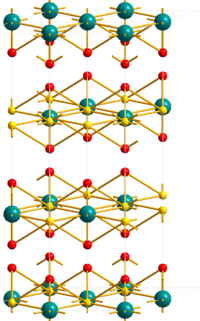Uranyl fluoride
| Crystal structure | ||||||||||||||||
|---|---|---|---|---|---|---|---|---|---|---|---|---|---|---|---|---|

|
||||||||||||||||
| __ U 6+ __ O 2− __ F - | ||||||||||||||||
| General | ||||||||||||||||
| Surname | Uranyl fluoride | |||||||||||||||
| Ratio formula | UO 2 F 2 | |||||||||||||||
| Brief description |
light yellow, greenish solid |
|||||||||||||||
| External identifiers / databases | ||||||||||||||||
|
||||||||||||||||
| properties | ||||||||||||||||
| Molar mass | 308.02 g mol −1 | |||||||||||||||
| Physical state |
firmly |
|||||||||||||||
| Melting point |
(none, decomposes above 300 ° C) |
|||||||||||||||
| solubility |
very good in water (64.4 g / 100 g water, 20 ° C) |
|||||||||||||||
| Hazard and safety information | ||||||||||||||||
 Radioactive |
||||||||||||||||
|
||||||||||||||||
| As far as possible and customary, SI units are used. Unless otherwise noted, the data given apply to standard conditions . | ||||||||||||||||
Uranyl fluoride (UO 2 F 2 ) is a uranium compound that is an intermediate product in the conversion of uranium hexafluoride UF 6 into a uranium oxide or into the metallic form of uranium; it is also formed when UF 6 reacts with atmospheric moisture .
properties
Uranyl fluoride is a light yellow, greenish solid, the color intensity of which varies somewhat. Well crystalline uranyl fluoride is only slightly hygroscopic . Above 300 ° C, UO 2 F 2 breaks down - depending on the temperature and oxygen pressure - into HF and UO 3 or U 3 O 8 .
toxicity
Acute toxicity is mainly due to the compound's fluoride ions ( fluorosis ). Uranyl fluoride, like all uranium compounds, is very toxic. Its radioactivity plays less of a role in terms of hazard, although certain radiation protection precautions should be taken if enriched uranium ( 235 U) is present in the compound, since natural uranium is an alpha emitter . The substance is corrosive and dangerous if inhaled, swallowed or in contact with skin. An incorporation by inhalation or ingestion can have a devastating effect on the organism. The consequences can be delayed.
literature
- Ingmar Grenthe, Janusz Drożdżynński, Takeo Fujino, Edgar C. Buck, Thomas E. Albrecht-Schmitt, Stephen F. Wolf: Uranium , in: Lester R. Morss, Norman M. Edelstein, Jean Fuger (eds.): The Chemistry of the Actinide and Transactinide Elements , Springer, Dordrecht 2006; ISBN 1-4020-3555-1 , pp. 253-698; doi : 10.1007 / 1-4020-3598-5_5 .
- Gmelin's Handbook of Inorganic Chemistry , Uranium, Supplementary Volume C 8, Springer-Verlag, Berlin, Heidelberg, New York 1980, p. 285.
Individual evidence
- ↑ a b J.J. Katz, E. Rabinowitch: The chemistry of uranium , Pt. 1, McGraw-Hill, New York-Toronto-London 1951, pp. 564-577.
- ↑ a b Georg Brauer (Ed.), With the collaboration of Marianne Baudler u a .: Handbook of Preparative Inorganic Chemistry. 3rd, revised edition. Volume II, Ferdinand Enke, Stuttgart 1978, ISBN 3-432-87813-3 , p. 1218.
- ↑ WL Myers: A literature review on the chemical and physical properties of uranyl fluoride , Appendix A of the PEIS (DOE / EIS-0269) (Los Alamos National Lab)., NM (USA) Illinois Univ. Urbana, IL (USA).
- ↑ David R. Lide (Ed.): CRC Handbook of Chemistry and Physics . 90th edition. (Internet version: 2010), CRC Press / Taylor and Francis, Boca Raton, FL, Properties of the Elements and Inorganic Compounds, pp. 4-97.
- ↑ Entry on uranium compounds in the GESTIS substance database of the IFA , accessed on February 1, 2016 (JavaScript required)
- ↑ Not explicitly listed in Regulation (EC) No. 1272/2008 (CLP) , but with the specified labeling it falls under the group entry uranium compounds with the exception of those specified elsewhere in this Annex in the Classification and Labeling Inventory of the European Chemicals Agency (ECHA) , accessed on February 1, 2016. Manufacturers or distributors can expand the harmonized classification and labeling .
- ↑ The hazards emanating from radioactivity do not belong to the properties to be classified according to the GHS labeling.
- ^ F. Coenen: "The preparation of α-UO 3 by the high temperature hydrolysis of uranyl halides", in: J. Inorg. Nucl. Chem. , 1966 , 28 , pp. 1733-1734; doi : 10.1016 / 0022-1902 (66) 80077-5 .
- ↑ Georg Brauer (Ed.), With the collaboration of Marianne Baudler a. a .: Handbook of Preparative Inorganic Chemistry. 3rd, revised edition. Volume II, Ferdinand Enke, Stuttgart 1978, ISBN 3-432-87813-3 , pp. 1185-1189.


